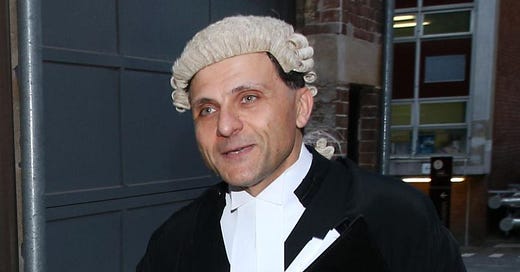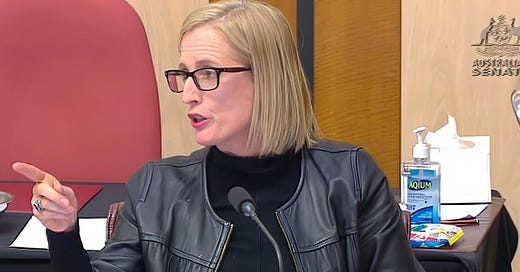
A revealing document has emerged which may have bearing on why the Brittany Higgins case was abandoned by the DPP Shane Drumgold. This could undermine his claim that his decision was purely based on protecting Higgins’ mental health.
Warning, this is one for those of you who are carefully following the twists and turns of this remarkable case and it will require you to read between the lines due to the careful wording required in this dangerous legal territory.
Two months ago, I pointed out that I was unable to report on this issue because the ACT Chief Justice had imposed a suppression order on the events leading up to this decision. Naturally our compliant media dutifully accepted Drumgold’s claims about Higgins vulnerability, ignoring all the evidence of her miraculous recovery, the pictures of her holidaying in the Maldives and accepting her degree, boasting of papers written during the trial.
Remarkably little public attention was paid to the legal basis for the DPP’s decision to drop the case. Normally the major reason to discontinue criminal proceedings is that there is no reasonable prospect of conviction. Yet in his press conference announcing his decision, Drumgold expressly stated that he had “a clear view there was a reasonable prospect of conviction” before the start of the trial and this is a view that he “still holds today”.
Last weekend, Janet Albrechtsen tiptoed through this legal minefield with a story in The Australian cleverly entitled, “Confused? Join the club. The Bruce Lehrmann story I can’t bring you.”
She was writing about the fact that Chief Justice Lucy McCallum had just published her judgement from last December as to why she suppressed details of what happened after the mistrial was declared last year.
McCallum’s judgement mentions an “application” brought by Bruce Lehrmann and his lawyers on December 2, 2022, the very day Drumgold decided to abandon the trial. But as Albrechtsen points out, journalists are still unable to reveal anything about that application because it remained secret by decree of Lucy McCallum’s court. This was all highly unusual, given that the Chief Justice had removed all other suppression orders related to the case.
Albrechtsen alluded to the interesting timing, that McCallum released her judgement about this unreportable application on the same day as the Sofronoff Inquiry got underway in Canberra. “Was the timing of these two events coincidental? Or were they linked? I can’t tell you. I don’t think I’m allowed to,” Albrechtsen commented.
Janet Albrechtsen made it very clear that there’s something very odd going on here: “That’s what’s really rotten about this state of affairs: I am not even entirely sure what I can and cannot tell you. So I have to take the safe course and say less, not more. This is surely untenable in an open and healthy democracy… Welcome to ‘open’ justice in 2023. It feels decidedly closed, even Kafkaesque.”
Now Albrechtsen has found a way through this legal coverup. Along with her colleague Stephen Rice, she’s just published in The Weekend Australian a remarkable 36-page draft submission to the ACT Supreme Court prepared by Sydney barrister Arthur Moses SC (pictured) which they claim “sheds new light on developments in the Lehrmann case that have been shrouded in secrecy because of suppression orders imposed by ACT Chief Justice Lucy McCallum.”
The Weekend Australian claims “this document, and the circumstances in which it was intended to be filed with the court, raise questions about the reasons for the decision by ACT Director of Public Prosecutions Shane Drumgold not to proceed with a retrial. Those issues are likely to form part of the Sofronoff inquiry into the conduct of the DPP and the Australian Federal Police that commenced this week.”
Here's more of The Weekend Australian’s report, with key points I’ve emphasised in bold.
The chief prosecutor in Bruce Lehrmann’s rape trial was “complicit” in a bid by Brittany Higgins to prejudice the case against him, according to an extraordinary draft submission to the ACT Supreme Court prepared by Sydney barrister Arthur Moses SC.
The explosive 36-page document obtained by The Australian sheds new light on developments in the Lehrmann case that have been shrouded in secrecy because of suppression orders imposed by ACT Chief Justice Lucy McCallum.
The draft submission prepared by Mr Moses – who was acting for Mr Lehrmann – related to an application filed by Mr Lehrmann’s lawyers on November 22 last year after the original trial was aborted in October due to juror misconduct. The Australian cannot legally report the nature of that application, which remains subject to a suppression order issued by CJ McCallum, nor does The Australian have any material filed in that proceeding.
However, The Australian has obtained a draft of Mr Moses’ proposed submission which was never finalised or filed with the court. The Australian understands this draft submission, dated December 1, was very close to being the final version that would have been filed the next day. The filing slated for December 2 did not proceed given the DPP’s shock decision, announced that same day, that he was dropping charges against Mr Lehrmann. Mr Drumgold’s stated reason was the mental health of Ms Higgins.
The Australian has been told that Mr Drumgold would have been aware of the central claims against him in the days leading up to his decision not to retry Mr Lehrmann.
In the submission, Mr Moses describes Mr Drumgold’s “inaction” over the emotional speech delivered by Ms Higgins outside court after Mr Lehrmann’s rape trial was aborted as “deeply troubling” and alleges the DPP failed to safeguard Mr Lehrmann’s fundamental right to a fair trial.
Ms Higgins claimed in the speech that the criminal justice system had “long failed to deliver outcomes to victims of sexual assault”, that Mr Lehrmann had not been forced to surrender his mobile phone and data – as she had – and that he had not been held accountable for “his actions”.
“Despite the trial judge giving a clear warning about the importance of preserving (Mr Lehrmann’s) right to a fair trial, (Ms Higgins) delivered a prepared speech to a crowd of waiting media at the front of the court,” Mr Moses said.
“The speech attacked (Mr Lehrmann’s) right to silence, ignored the presumption of innocence, and impugned the fairness of the criminal justice system.”
The speech clearly had the potential to improperly influence and place pressure on jurors in any retrial and was factually wrong because Mr Lehrmann did surrender his mobile phone to police, Mr Moses said.
“In the absence of evidence from Mr Drumgold as to any warning given by him to (Ms Higgins) concerning the possibility that her conduct may undermine the integrity of the trial it may be inferred and therefore found that (Mr Drumgold) failed to take the most basic, obvious and fundamental of steps as part of his positive and inviolable duty to ensure a fair trial.”
Not only was Mr Drumgold’s “inertia” inconsistent with his obligations as a prosecutor to safeguard Mr Lehrmann’s right to a fair trial, “but it also gives rise to the inference that (Mr Drumgold) condones the speech”, Mr Moses says in the draft opinion.
In any event, Mr Moses said, by failing to take any effective steps to prevent the speech or remove it from publication, Mr Drumgold had been “complicit” in Ms Higgins’ conduct and “the prejudice to (Mr Lehrmann’s) right to a fair trial has occurred as a result of egregious conduct by the Crown, and those for whom the Crown is responsible”.
An inquiry led by Walter Sofronoff KC is examining the conduct of the DPP, the Australian Federal Police and the ACT Victims of Crime Commissioner during the Lehrmann-Higgins saga. Mr Sofronoff’s terms of reference include examining whether the DPP failed to act in accordance with his duties or acted in breach of his duties in making his decisions to commence, to continue and to discontinue criminal proceedings against Mr Lehrmann, and if he did, his reasons and motives for doing so.
The first public hearing of the inquiry began on Monday, the same day CJ McCallum elected to publish her judgment dated December 2 last year where she gave reasons for continuing to suppress material about the case – including the nature of the application for which Mr Moses had drafted his submission – even after the DPP announced he would not re-try Mr Lehrmann.
Mr Drumgold told a press conference a retrial would pose a “significant and unacceptable risk to the life of the complainant” but surprised many in the legal profession by lauding Ms Higgins’ conduct and publicly stating he still believed there was a reasonable prospect of convicting Mr Lehrmann at a second trial.
Mr Moses’ draft submission to the court was prepared in the days before Mr Drumgold’s decision not to proceed with the retrial, as part of the November 22 application brought by Mr Lerhmann’s lawyers.
A past president of both the NSW Bar Association and the Law Council of Australia, Mr Moses has represented many of the highest-profile litigants and defendants in Australia during his 30 years at the Bar.
In his draft submission to the ACT Supreme Court, Mr Moses described Ms Higgins’ speech as “an extraordinary attack on the criminal justice system and the fundamental rights of an accused” that “deliberately generated adverse publicity to prejudice (Mr Lehrmann’s) ability to receive a fair trial”.
“It denigrates (Mr Lehrmann’s) presumption of innocence and right to silence, and seeks to invert the Crown’s onus of proof, by implying that (Mr Lehrmann) is using a broken criminal justice system to conceal his guilt, as others have done before him.
Mr Moses said the prejudicial nature of the speech was amplified by a number of factors, including the widespread publication of the comments and the endorsement or support for Ms Higgins, including from then prime minister Scott Morrison, who apologised in parliament to her “for the terrible things that took place here”.
Mr Moses also references the February 2022 National Press Club event when Ms Higgins spoke about “my rape”.
“The conduct of prominent persons and public institutions and the lending of credibility to (Ms Higgins) concerning her allegations against the accused has corrupted the process leading up to the trial in a way that is not capable of being remedied by directions given to a jury,” Mr Moses said.
“This is an extraordinary case, where from the day the allegations became public the conduct of a complainant and the lending of credibility to her allegations against the accused by prominent persons and trusted public institutions has been unprecedented.
“That unprecedented public conduct of (Ms Higgins) and others called for the most elementary of steps to be taken by (Mr Drumgold) to seek to ensure a fair trial.”
Mr Moses noted that Mr Lehrmann’s solicitor wrote to Mr Drumgold on November 14 last year raising concerns about Ms Higgins’ speech and asking what action he proposed to take, including steps to have any publication of it removed, and to ensure her conduct was not repeated.
Mr Drumgold’s curt, three-sentence reply was “remarkable”, Mr Moses said. After confirming receipt of the letter, the DPP wrote: “My office does not make public comment about matters before the court, and we continue to strongly discourage everyone (including defence) from making public comment on a matter currently before the court.”
There was no evidence of any warnings that Mr Drumgold had provided to Ms Higgins about the importance of not making prejudicial public statements, or “that her conduct may undermine the integrity of the trial”, Mr Moses said. In the absence of such evidence the court could infer that Mr Drumgold had not done so, “and in failing to do so has failed to take easy and obvious steps in doing all things that are reasonably necessary to ensure a fair trial”.
Mr Moses cites several cases in which Ms Higgins made public statements about the case after Mr Lehrmann was committed to stand trial, including interviews with The Australian Womens Weekly and Marie Claire magazine, an address at the National Press Club, and an Instagram post containing the transcript of a covertly recorded phone call between herself and a witness in the trial, Daniel Try.
“There is no evidence of any warnings that (Mr Drumgold) has provided to (Ms Higgins) about the importance of not making public statements that could prejudice (Mr Lehrmann’s) right to a fair trial at any time from February 2021 to just before the speech. This begs the question as to whether (Mr Drumgold) has ever advised (Ms Higgins) that her conduct may undermine the integrity of the trial.”
So, there you are. Interesting material which may provide useful information for Sofronoff in his determination of whether Drumgold acted in breach of his duties as a public prosecutor.
















As I wrote, Lehrmann was required to serender his phone. Higgins was wrong, yet again!
Thanks Bettina.,
As always you get to the core of this corruption of the legal process. I fear the DPP got a bit carried away with his own importance.
Lehmann denied that rape in any form, or even intimacy, took place. As there is no physical or scientific evidence presented to support the claim, the charge was on very shaky ground at best.
The second point of proof would be prove, beyond reasonable doubt, that rape took place. There isn't any. He should never have been charge and this is no doubt what the police told the DPP.
The fact that the jury never raised any points of law or clarification with the judge in the 3 or 4 days of deliberation tells me that the issue was just one of reaching a unanimous decision.
The DPP would have known that a second trial would probably have reached the same impass or found him not guilty. That has left Lehmann with no other option but to pursue clearance of his name through further litigation.
The limp reason given of Higgins mental health was just that, limp. This was amply demonstrated by her subsequent behaviour.
It's a very sorry saga of a couple of over paid young adults having a night on the town. Both should except responsibility.
The result of the enquiry will be very interesting.